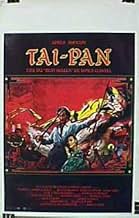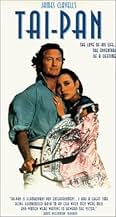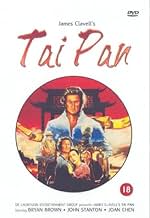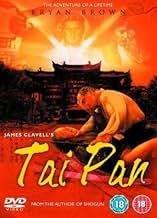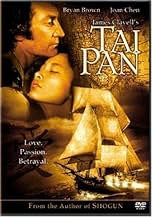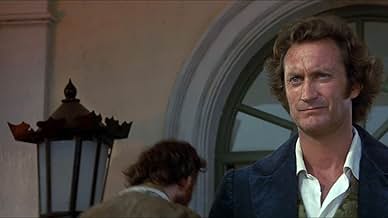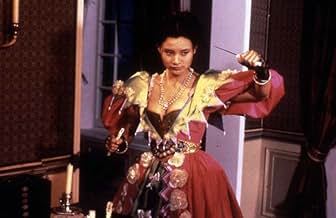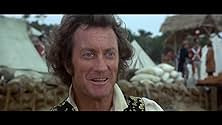NOTE IMDb
5,6/10
2,1 k
MA NOTE
Ajouter une intrigue dans votre langueHistorical fiction set against the backdrop of Hong Kong in its early years of British rule.Historical fiction set against the backdrop of Hong Kong in its early years of British rule.Historical fiction set against the backdrop of Hong Kong in its early years of British rule.
- Réalisation
- Scénario
- Casting principal
- Récompenses
- 2 nominations au total
Avis à la une
As a movie reviewer for my college newspaper, I often was told: "You've got a great job, you get paid to go to movies." My standard answer was: "It's not that great - I had to sit through 'Tai-Pan'." The only movie that has given me more pain was "Ishtar."
As another reviewer put it, this movie was very similar to Dune. Very interesting comparison, since Raffaella De Laurentiis produced them both. This was her first project right after Dune. Both were sweeping epic sagas with multiple intertwined plotlines. Both should have been six or eight hour mini series and not feature films. As with Dune, you will find that if you have not read the book, you will not understand the movie. However, if you have read the book, then the movie isn't all that bad. James Clavell's 'Asian Saga' is one of my favorite book series, so I bought this movie cheap just to see it. The characters are like old friends to me, so I didn't think that the movie was all that bad. I realized while watching it though, that someone who had not read the book would not be able to keep up with all of the plot points. My suggestion to you is to read the book, then watch the movie. You will discover two things; first it's a super good book. Second, this movie had everything going for it in cast and settings; it just had too much story to tell in too short a time. It definitely should have been a six-hour miniseries.
Adventure film based on James Clavell's novel about a 19th-century trade baron who makes his headquarters in Hong Kong. This is the 3rd worst motion picture I've ever seen in a theater (behind Rebel and Dune.) It seemed that the original intention was to have made this as a TV mini series and not for theatrical release. One point in the film Bryan Browns character Dirk Struan tells another male character "When you make dung you'll wipe your arse with paper". The entire theater crowd erupted in laughter for about five minutes and it appeared that the line was not intended to be humorous. That's how bad this movie was.
Tai-Pan was probably too ambitious an undertaking for a film as short as just over 2 hours. Maybe a mini-series would have been the answer, but Tai-Pan certainly had the potential to be an oriental Gone With The Wind.
Unrealized potential though it is. The screenplay made many references to previous events in the novel that are not shown here. We do know there's one nasty rivalry going on between Bryan Brown and John Stanton who both rose to wealth in the China trade like the protagonists in an Edna Ferber novel.
Bryan Brown is the Far East version of Rhett Butler. He's built the family fortune on legal trade and illegal trade in opium. Not that opium was unknown before the British and other European powers got there, but they did turn it into a thriving business. When the Chinese government objected, the European powers took nibbles out of a prostrate and weakened state.
One of those nibbles the British took was Hong Kong, spoils from the Opium War of 1841. Brown like Margaret Mitchell's Rhett Butler or the hero of many Edna Ferber books is the guy who builds what became one of the busiest trading centers on the globe.
Unlike his rival Stanton, Brown's wife left him and took their small son back to the United Kingdom. Brown didn't mourn he took up with some Chinese women, they were pawns in various business negotiations. He got a son, Russell Wong, from one of them.
Things get interesting when his other son arrives from Great Britain played by Tim Guinee. He's a rather uptight Victorian youth who is not pleased with the debauchery he finds and his father's part in it.
Tai-Pan is exquisitely photographed with the climatic typhoon scene very well done indeed. A better screenplay would have been needed to tell this epic story.
Unrealized potential though it is. The screenplay made many references to previous events in the novel that are not shown here. We do know there's one nasty rivalry going on between Bryan Brown and John Stanton who both rose to wealth in the China trade like the protagonists in an Edna Ferber novel.
Bryan Brown is the Far East version of Rhett Butler. He's built the family fortune on legal trade and illegal trade in opium. Not that opium was unknown before the British and other European powers got there, but they did turn it into a thriving business. When the Chinese government objected, the European powers took nibbles out of a prostrate and weakened state.
One of those nibbles the British took was Hong Kong, spoils from the Opium War of 1841. Brown like Margaret Mitchell's Rhett Butler or the hero of many Edna Ferber books is the guy who builds what became one of the busiest trading centers on the globe.
Unlike his rival Stanton, Brown's wife left him and took their small son back to the United Kingdom. Brown didn't mourn he took up with some Chinese women, they were pawns in various business negotiations. He got a son, Russell Wong, from one of them.
Things get interesting when his other son arrives from Great Britain played by Tim Guinee. He's a rather uptight Victorian youth who is not pleased with the debauchery he finds and his father's part in it.
Tai-Pan is exquisitely photographed with the climatic typhoon scene very well done indeed. A better screenplay would have been needed to tell this epic story.
first, inject countless clichés and stereotypes, populate the cast with some well-knowns, and add some 'tit'illation.
and wait for the box office receipts to pour in!!!
I am very very disappointed in this film which I purchased on VHS. its one of those I *know* I wont be watching a 2nd time.
it meanders, gap toothed, and those stereotypes just weigh it down till it sinks in Hong Kong harbor. and of course, top it all off with a quickie pan of modern day Hong Kong.
some good acting but not enough to overcome the numerous shortcomings.
I didn't read the book but Im sure it far outclasses this quickie 2 + hour 'featurette'. is there a Hollywood ombudsman you can call up to you know, get your money back or something?
Im glad IMDb exists so that duds like this can be outed and red-flagged.
and wait for the box office receipts to pour in!!!
I am very very disappointed in this film which I purchased on VHS. its one of those I *know* I wont be watching a 2nd time.
it meanders, gap toothed, and those stereotypes just weigh it down till it sinks in Hong Kong harbor. and of course, top it all off with a quickie pan of modern day Hong Kong.
some good acting but not enough to overcome the numerous shortcomings.
I didn't read the book but Im sure it far outclasses this quickie 2 + hour 'featurette'. is there a Hollywood ombudsman you can call up to you know, get your money back or something?
Im glad IMDb exists so that duds like this can be outed and red-flagged.
Le saviez-vous
- AnecdotesProducer Martin Ransohoff and the Metro-Goldwyn-Mayer studio in 1966 acquired the rights to James Clavell's source "Tai-Pan" novel for US $500,000. The movie was then announced by MGM in 1967-68 to star Patrick McGoohan to play Dirk Struan, to be directed by Michael Anderson, with source novelist Clavell writing the screenplay. The picture was originally budgeted to cost US $26 million which was then reduced to US $20 million. The project sat around stagnant for a time in development hell. However, after severe operating losses, the epic was one of a number of expensive projects the new management at the MGM studio dropped as being too costly. The project and the development of the movie at MGM was in the end canceled by executive James T. Aubrey.
- GaffesIn a scene, set in 1841, several of the ladies were wearing bright mauve outfits. That would have been most unlikely for the wives of middle class traders at that time as the color purple was prohibitively expensive before the invention of analine dyes in London - in 1856. By 1870 these gaudy colors had become so cheap and commonplace that it became a status symbol to mimic the subtler, paler colors of the pre analine dye days.
- Citations
Dirk Struan: No emperor has seen the guns of a British man-of-war.
Meilleurs choix
Connectez-vous pour évaluer et suivre la liste de favoris afin de recevoir des recommandations personnalisées
- How long is Tai-Pan?Alimenté par Alexa
Détails
Box-office
- Budget
- 25 000 000 $US (estimé)
- Montant brut aux États-Unis et au Canada
- 4 007 250 $US
- Week-end de sortie aux États-Unis et au Canada
- 1 863 469 $US
- 9 nov. 1986
- Montant brut mondial
- 4 007 250 $US
- Durée
- 2h 7min(127 min)
- Mixage
- Rapport de forme
- 2.35 : 1
Contribuer à cette page
Suggérer une modification ou ajouter du contenu manquant

